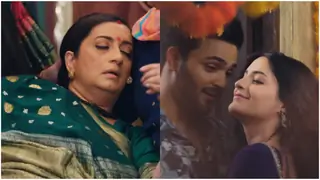Sameer, scion of the poet-lyricist Anjaan and Monty Sharma, son of ace musician Anand Sharma and nephew of composer (Laxmikant-)Pyarelal come together in Saawariya
SAMEER
At the music launch of Saawariya you stressed that it took you 500 films to get a Sanjay Leela Bhansali project. How was the experience?
The experience was fantastic. It shattered a lot of myths that I had heard about Sanjay and it also made me realise yet again the crucial difference between a filmmaker who knows his job thoroughly and one who does not. And what were the myths?
There was a certain aura built around Sanjay by the media and everyone else. I had heard that he takes weeks or months to approve a song, and about his moods and temper. But I was still keen on meeting him. I told him "Sanjaybhai, I have only one condition for working with you - that I will do the whole film and not just one or two songs." And what did he say?
He told me that in the previous one year he had been listening only to two songs - and both were mine! One was Tumse milna from Tere Naam and the other was Mohabbatein lutaoonga from Abhijeet Sawant's debut album! When he narrated Saawariya I realised why he had been listening to these songs - the subject was completely youth-oriented and he needed simple, catchy and attractive songs.
Sanjay was very clear about his needs: he said that he wanted the kind of lyrics for which I was known. "You are the writer of this generation!" he told me. What about the two songs that are written by Nusrat Badr and Sandeep Nath?
When I expressed my pre-condition, Sanjay honestly said that he had two songs that were already recorded for another film and that there was a good chance he would use them here. How was it working with a new composer in Monty Sharma?
Another reason why Saawariya was special was that at that time I was already a bit upset with the monotonous music that was happening then. This was something steeped in melody and close to my heart. Monty has an edge over most other composers because he understands the mathematics and the crafting of a song. It is always different when the music director himself does everything rather than when he composes and someone else arranges the songs. Monty can write, compose, arrange and record music. But Sanjay did take a long time over the songs.
Sanjay is like what Raj Kapoor was - he is completely sure of what he wants, his situation and his character. The moment his song is ready, the visuals are completely clear in his head and he mentally shoots a song 20 times before the actual filming. Work on the music of this film took 24 to 30 months, but no song that I wrote took more than 2 days to be written and approved!
The first song that I wrote was Masha-Allah and Sanjay told me that he could not believe that anyone could write a song to such a complex metre in two days. He told me that his previous writers had often taken one to one-and-a-half months and sometimes not delivered what he wanted even after that! The title-song has become a rage.
Yes, and it is Sanjay's favourite song, but there is a little story behind it. In my career there have been two standout films in which the title was so inspiring that I wanted to pen a title-song but the filmmaker did not want it - Saajan and this film! In both cases, I persuaded them otherwise and the songs became chartbusters!
The word Saawariya pertains to the way a girl addresses a beloved and is not in common use today. Sanjay asked me how I could write a title-song with this word in it that would be sung by Ranbir Kapoor and not Sonam Kapoor. I told him, "I will do it". I wrote on Monty's tune and after it was recorded, Sanjay was sold by the song and how I had justified his title and thus the lyrics from Ranbir's perspective. Saawariya is touted as your first with Sanjay Leela Bhansali. But you had done a song 'More piya...' in Devdas.
What happened was that Bharat Shah was presenting Devdas and the previous writer was not able to deliver what Sanjay wanted for weeks. Time was running out and Bharatbhai was in legal trouble. So he requested me to take over.
When I met Sanjay then, he told me, "This is not just a song, it's a ras-leela." He even showed me a painting of the kind of set he had in mind. I accepted the challenge, and as it happened, that song too was approved in two days! Maybe he remembered me for that too. What next after Saawariya?
I am really looking forward to Tips' and Abbas-Mustan's Race with Pritam. I am working with Nadeem-Shravan in Dharmesh Darshan's, Mukesh Bhatt's and Suneel Darshan's coming films. I am doing Raj Kanwar's next with Adnan Sami, Shemaroo's next film that is directed by Priyadarshan with music by Rajesh Roshan, and all the three films of Himesh Reshammiya - Karz, Pooja Bhatt's film and John Matthew Matthan's film all co-produced by T-Series. There is also Kamal Haasan's Dashavataram with Himesh again. MONTY SHARMA
The Full Monty background:
Monty Sharma is new to film composing, but otherwise has been working in the film industry for 20 years. The son of violinist/viola player Anand Sharma, Monty began learning music at the age of five from his illustrious grandfather Pt. Ramprasad Sharma who, beginning with Pyarelal, has groomed musicians from Uttam Singh to Jatin-Lalit. "My grandfather was a far-sighted visionary who saw the change in sound coming decades before it did. He made it a point to know every instrument's range, and he told me that as I grew from musician to arranger to composer, I would need to know Indian as well as Western classical music. So he introduced me to the seven books of Bhatkande, while Merlyn Chhabra was my teacher in Western as she was connected to the Trinity College of Music."
Monty was about to give his school board examinations when Pyarelal, who had heard him on the piano, called him to play the keyboard for Mr India (1987). "I would give each examination paper and move to the studio," says the youngster. "Within a week, on merit, I moved up the cadre of musicians and began to play apart from Laxmikant-Pyarelal for R.D.Burman, Nadeem-Shravan, Sajid-Wajid, Sanjeev-Darshan and even Ismail Darbar. I programmed Dholi taaro dhol in Hum Dil De Chuke Sanam and arranged a song for Devdas. And that was my introduction to Sanjay Leela Bhansali."
From there to Saawariya's songfest was not a straight journey however. "I programmed most songs of Hum Dil De Chuke Sanam," says Monty. "Sanjay was so impressed that he entrusted me with the background music of Devdas, which I said I would do on condition that I was officially credited with it.
"After that, Sanjay heard my tunes and we started working on Bajirao Mastani that he was planning then. We actually recorded some songs to know what they sounded like and then the film was shelved and Black happened. Sanjay loved the song I made, and so did Amitabh Bachchan. But we worked for weeks on the song but finally it was a bit too late to incorporate it in the film." On the Saawariya experience:
"Contrary to what people say, Sanjay gives a composer complete freedom," Monty stresses. "He was very open to my views even when I would contradict him. He always had suggestions but would never impose them. If I asked for 40 violins, 12 violas and 12 cellos he was more than willing, which in today's times is unique because no one wants to invest so much money and time in music." The composer says that they spent on an average 10-30 days on each composition. "We put our heart and soul into each track. I wanted to ensure that whatever I did was original," says Monty. "The first song we recorded was Yoon shabnami and Parthiv Gohil, who had sung all the alaaps in Devdas and is a trained singer, was the unanimous choice. Thode badmash ho tum was a lovely composition by Sanjay himself and he asked my permission to use it. It was a superfluous question, and all I insisted was that he had to get the credit too."
It is said that Sanjay did not allow Ismail Darbar, his earlier composer, to work outside even as a musician and handsomely compensated him for the money he lost while working for months on his earlier films. Did that happen with Monty too?
Says Monty, "Sanjay knew that I was busy already. I did the background music of films like Aashiq Banaya Aapne, Dil Diya Hai and Nanhe Jaisalmer while the music of Saawariya was being made. Sanjay knew that I was busy on these films and a musician too. All he insisted on was complete focus, commitment and time when we were working on his film, which was what I aimed for too, because I knew that this was an extraordinary opportunity as a debut and was absolutely sure of what I wanted to do in every respect." On his music team
Says Monty, "Sameerji is very cool, reaches out very quickly with his songs and has a lot of simplicity. We wanted a known name since Ranbir Kapoor, Sonam Kapoor and I were all new."
But the established convention is to have one playback voice for the launch of a major star, and Ranbir has many playback voices in the film. Why is that? Candidly, the composer says, "The songs are very situational and we felt the need to experiment with different voices on Ranbir. Besides, multiple voices enhance the audio value of an album today. I did the more experimental songs with Kunal Ganjawala. Shaan had to be the choice for Jab se tere naina for the perfect young and naughty feel. As for Shail Hada, who is also my assistant, he is a truly siddha (someone who reaches a sublime level with sheer dedication) singer and an M.A. in Music. I wanted one song with him and he recorded the title-song in 25 minutes flat. Earlier, he too had sung alaaps in Black." On his music lineage:
"Pyarebaba (Pyarelal) told me, 'When you step into music, you can do one of two things - copy our style like some others did, or be so original and good that after 10 years people will copy you!' I was very clear that I would not go the first way, and the only compromise of sorts that I made was in Rani Mukerji's song sung by Alka (Yagnik)ji. That was because such songs are too well-accepted, especially L-P's creations in that genre, and I had to follow convention there. Otherwise my music is very contemporary.
"Alkaji commented on the feel of the music being like them because of this song. Others have talked about the canvas or the grandeur of the sound. I guess some amount of this flair is inborn because of my grandfather, Pyarebaba and my father. Like them, I want to create sound rather than take the help of synths and loops and other readymade music. Believe me, I have consciously stopped listening to film music for 10-15 years. I consider this very important if I have to make my own identity." On his ambitions:
"Whatever work I do must make an impact, and whether in songs or in the background music my music must not go unnoticed," stresses Monty. "When I worked on Black, I created sounds and themes for each character and situation and they had to make an impact, which is how I got the Screen award for Best Background Score.
"I will never compromise on my sound. I will always use what is demanded by the film. Indian percussion is out of fashion now but I have even used the bulbul-tarang in one song. I am fully aware that I cannot get a Sanjay Leela Bhansali each time, but I am prepared to make the best use of the resources I get, like I may not use 40 but 10 or 20 strings if the film has a smaller budget. I will see to it that my music will have the same intensity each time."
http://www.screenindia.com/fullstory.php?content_id=17700
|
































